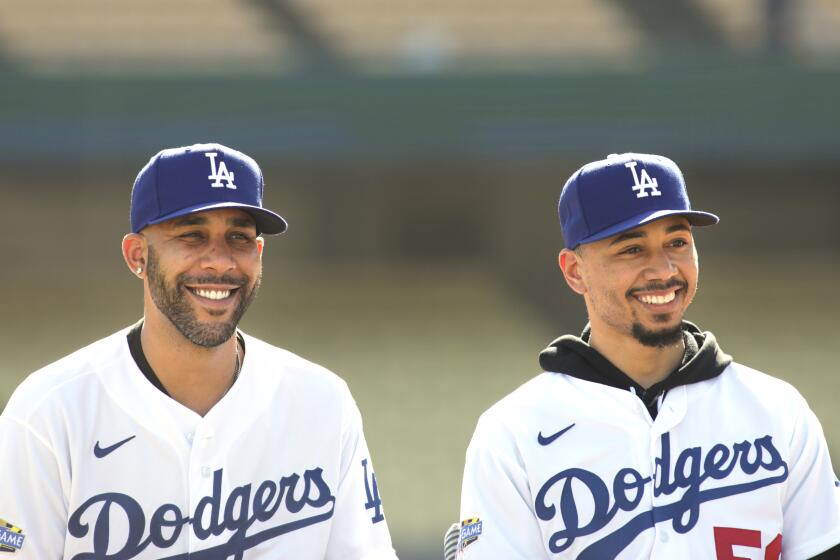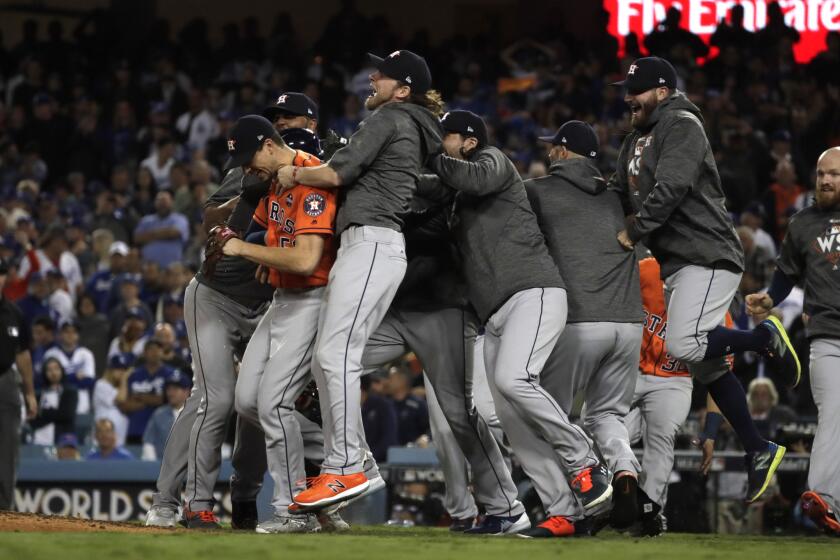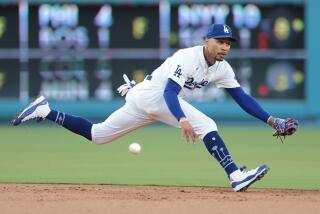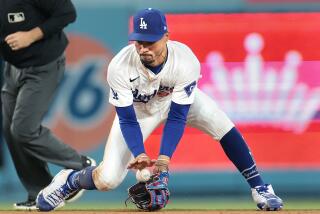Column: David Price says he’s still got it, but he’ll have to prove it with the Dodgers
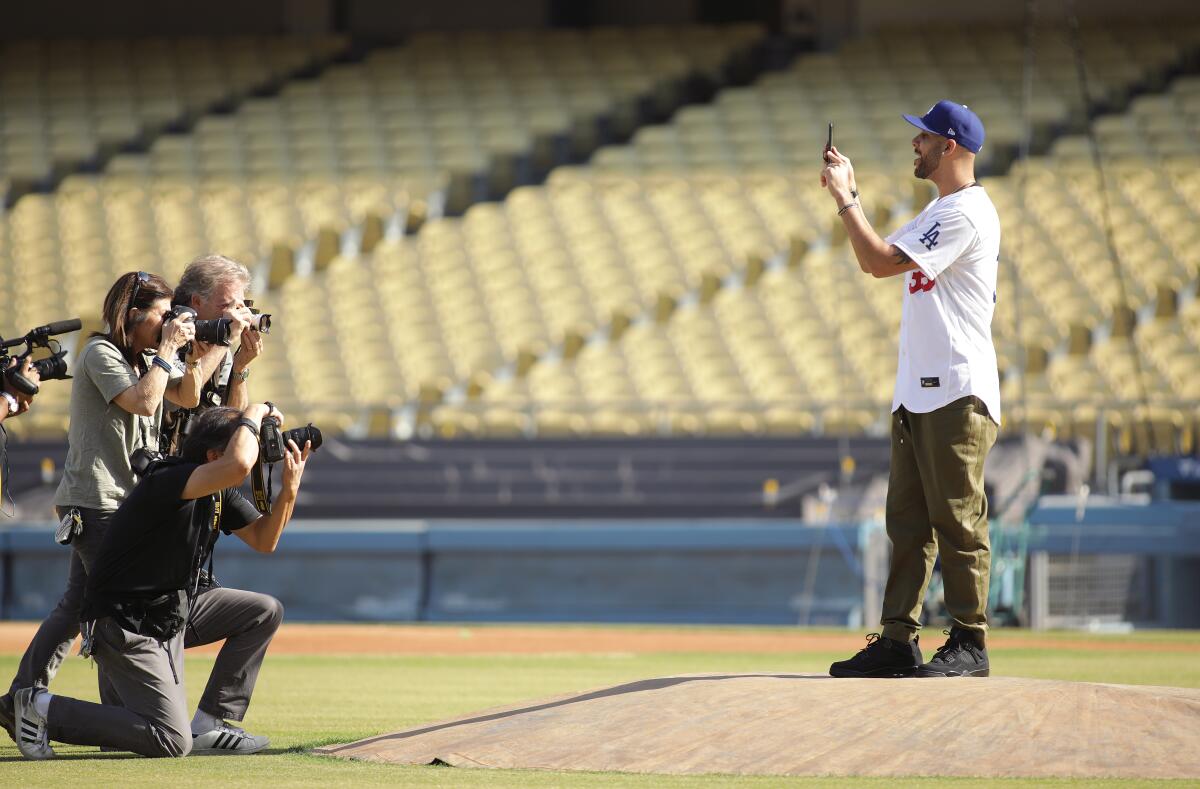
He is “the other player” in the Dodgers’ trade for Mookie Betts.
A throw-in.
A salary dump.
Are people sleeping on David Price?
Price began his response similar to how he did several others Wednesday at the news conference introducing him and Betts, with a pensive “Ummm …”
Mookie Betts and David Price were introduced at Dodger Stadium, the culmination of a trade with the Boston Red Sox that overcame obstacles to come to fruition.
He smiled.
“I don’t know,” he said.
The remainder of his answer was diplomatic, about how he expects to take the mound every fifth day, and so on.
Except what Price said earlier, and how he said it, indicated that he did know. He sounded as if he was certain there was another vintage David Price season or two remaining in a left arm that has pitched more than 2,000 innings in the major leagues.
Price laughed when this was pointed out to him.
“Absolutely,” he said.
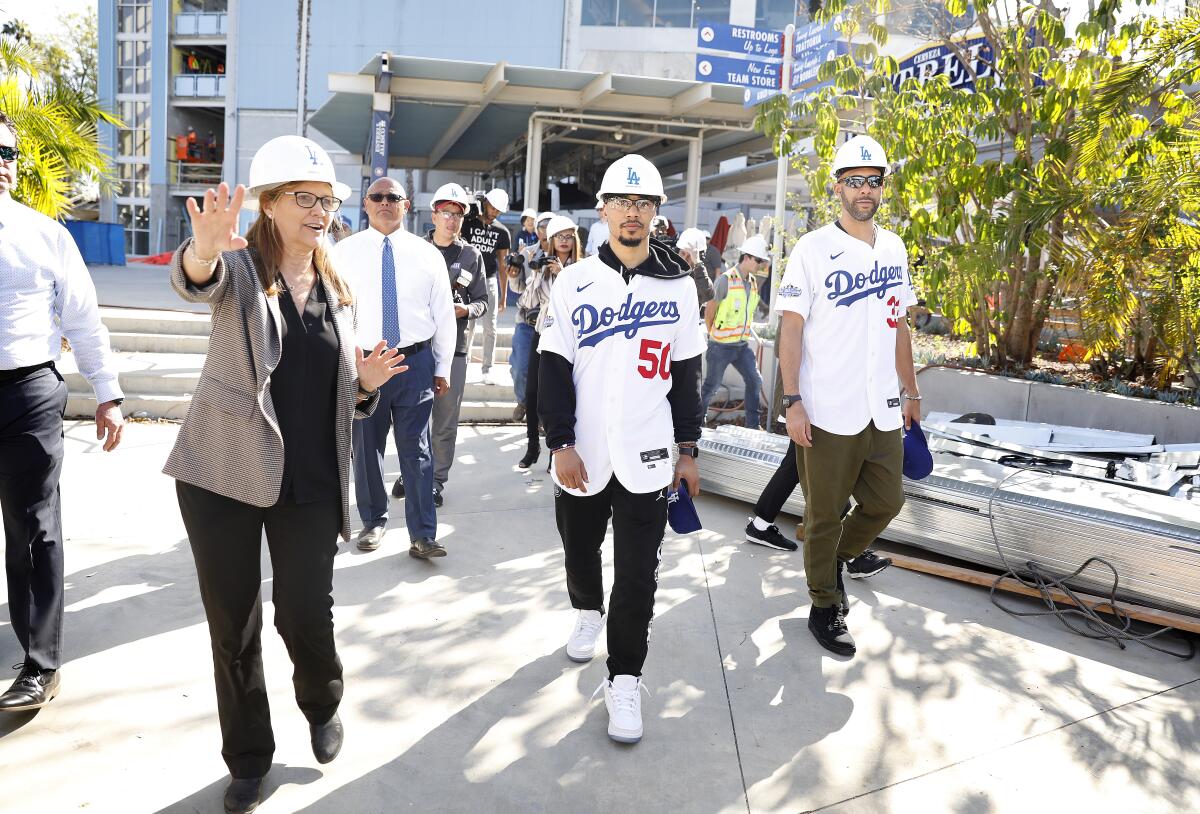
He paused for a moment to gather his thoughts.
“I have a lot of confidence in myself,” he said.
Price is a former Cy Young Award winner. He has made five All-Star teams.
But the left-hander is also 34 and missed significant parts of two of the last three seasons because of various arm injuries. When the Red Sox sent him to the Dodgers with Betts, they also sent $48 million to cover half of what he will be owed over the next three seasons.
The Dodgers are uncertain of what they have in him.
“Right now, I see him in the middle of our starting rotation and we’ll go from there,” manager Dave Roberts said.

When Price won the American League Cy Young Award with the Tampa Bay Rays in 2012, his average velocity on his four-seam fastball was 96.5 mph, according to PITCHf/x data collected by Brooks Baseball. That number was down to 92.4 mph last year.
He has combated the effects of age by altering his pitch mix, relying more on his cutter. Last year, his repertoire was as varied as it’s ever been, with his sinker accounting for 28.1% of his pitches, change-up 25.9%, four-seam fastball 23.8% and cutter 19.7%.
Price recalled what he was told by Tim Corbin, his coach at Vanderbilt University, and Jim Hickey, his pitching coach with the Rays who is now working in the Dodgers player development system.
“Don’t wait for that time to come where you have to evolve,” Price said. “If you can evolve now and keep everybody kind of on their toes and keep them guessing with what you’re going to do next and stuff along those lines, it can prolong your career.”
This was the version of Price who shut down the Dodgers in the 2018 World Series over two starts and a relief appearance, in which he was 2-0 with a 1.98 ERA.
President of baseball operations Andrew Friedman complimented Price for how well he commands multiple pitches and pointed to how well he started last season. Price was 4-2 with a 2.70 earned-run average through his first 11 starts last year. He finished the season with an average of 10.7 strikeouts per nine innings, the highest of his career.
When the Houston Astros present themselves publicly, they will not do so as AL champions. They will do so as baseball’s greatest villains of this generation.
But declining velocity isn’t the only obstacle Price has encountered in his relatively advanced age. His health has also become a concern.
Price was limited to 74 2/3 innings in 2017 by elbow problems. He made 30 starts the following year, but his season ended prematurely last year because of a cyst in his left wrist. He underwent surgery in September to remove the growth. He finished the season with a 4.28 ERA.
“It would just get inflamed and it would swell up and it would just cut everything off to my hand,” he said. “My hand would get cold and I would lose feeling in it.”
Price said he experienced problems as far back as when he pitched for the Rays.
The operation has made a difference.
“I can feel it in every day activity and more so if I’m playing catch or throwing a bullpen,” he said.
Price said he will be to participate in the Dodgers’ first workout for pitchers and catchers on Friday.
The Dodgers are well-known for using their pitching depth to give their pitchers extra days off or to skip their turns in their rotation. While Price declared he wanted to make 30-plus starts, he also said, “I’ll do whatever these guys ask me to do.”
He quickly reconsidered.
“Anything but catcher,” he joked. “I take that back. That is one thing I will not do.”
The audience guffawed.
That wasn’t the only time he elicited laughter.
When he spoke about how the switch to the National League would provide him the opportunity to hit, Betts remarked that he was two for his last four.
“Two for my last three,” Price corrected him.
Friedman believes this personality will be an asset.
“Obviously, the success he’s had is evident and everybody knows about that, but he was as good of a teammate as I’ve ever seen,” Friedman said. “Just the impact he has in the clubhouse was as significant as I’ve seen.”
Friedman was the general manager of the Rays when they drafted Price first overall in 2007. He ran the team’s baseball operations department when Price broke into the major leagues.
He remembered how Price would watch other starters throw their bullpen sessions. Or how he used to be on the top step of dugout on days he didn’t pitch.
“A lot of times guys go in the clubhouse and check their phone and do things,” Friedman said. “David is locked in on the four days he’s not starting. I think that really rubs off.”
Price said he was heavily influenced back then by Rays pitcher James Shields, who is from Southern California. Price will wear No. 33, which is the same number Shields wore for the majority of his career.
And maybe Price will pitch like he did back then, too.
A move from the hyper-competitive A.L. East to the N.L. West will certainly help.
The last time the Dodgers made a blockbuster trade with the Red Sox, the centerpiece of the deal was Adrian Gonzalez. As part of the swap, the Dodgers agreed to take on Josh Beckett, who was 32 and supposed to be finished. Beckett was 5-11 with 5.23 ERA at the time of the trade.
Beckett registered a 2.93 ERA with the Dodgers over the remainder of that season. Two years later, he made 20 starts and was 7-7 with a 2.88 ERA. The victories included a no-hitter.
In other words, Price could very well be right. The other player could become a frontline starter again, the throw-in an All-Star, the salary dump a champion.
More to Read
Are you a true-blue fan?
Get our Dodgers Dugout newsletter for insights, news and much more.
You may occasionally receive promotional content from the Los Angeles Times.

